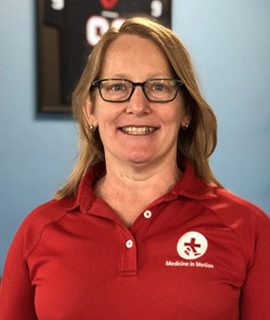Eating Disorder
Book Your Appointment

Eating Disorder
For some people, what starts as a small diet to lose a few pounds, turns into a self-loathing or fear of fat that causes extreme eating changes. Extreme changes can lead to fatigue, dizziness, heart palpitations, changes in the menstrual cycle, loss of bone strength, and abnormal lab tests indicating several body systems could be suffering.
For some, this can even lead to heart failure and death as the fear of gaining weight leads to severe starvation. In fact, eating disorders have one of the highest mortality rates of all mental health disorders.
At Medicine In Motion, we help patients through eating disorder treatments Austin, TX. Eating disorders can take many forms, such as binge eating, fasting, restrictive dieting, over-exercising, purging, or any combination.
As a physician, Dr. Pyron’s job is to monitor and guide patients from an unhealthy medical state to a healthy state. The patients also work with dietitians and eating disorders therapists to gain insight and mental health strategies to grow into remission from the eating disorder.
Dr. Pyron will monitor the status of the heart, the organ systems, and the bone density and help manage decisions that lead to physical recovery. In contrast, therapists and dieticians help clients work toward mental healing.
A team approach is the best for complicated medical concerns such as eating disorders. At Medicine In Motion, we care about eating!! Food is our friend!! And healthy eating leads to a healthy mind, body, and life!

Eating Disorder FAQs
Medicine in Motion approaches the treatment of eating disorders with a team-based approach that includes a physician, dietitians, and therapists. The physician monitors the patient’s physical health, while the dietitians and therapists work with the patient to develop healthy eating habits and address the underlying psychological issues. The goal is to guide patients from an unhealthy medical state to a healthy state, both physically and mentally.
Medicine in Motion helps patients develop a healthy relationship with food by working with dietitians and therapists. Dietitians provide guidance on healthy eating habits, while therapists help patients address the underlying psychological issues that contribute to their eating disorder. The goal is to foster healthier food relationships and provide lasting coping strategies.
Medicine in Motion helps patients with eating disorders by providing comprehensive treatment that addresses both the physical and mental aspects of these conditions. As a physician, Dr. Pyron monitors and guides patients from an unhealthy medical state to a healthy state, monitoring the status of the heart, the organ systems, and the bone density and helping manage decisions that lead to physical recovery. Patients also work with dietitians and eating disorders therapists to gain insight and mental health strategies to grow into remission from the eating disorder.
Medicine in Motion manages the mental healing of patients with eating disorders by working with therapists and dieticians. These professionals help clients work toward mental healing by providing insight and mental health strategies to grow into remission from the eating disorder. The goal is to foster healthier food relationships and provide lasting coping strategies.
Medicine in Motion manages the physical recovery of patients with eating disorders by monitoring the status of the heart, the organ systems, and the bone density. Dr. Pyron helps manage decisions that lead to physical recovery. The goal is to guide patients from an unhealthy medical state to a healthy state.
Medicine in Motion supports patients in remission from eating disorders by providing ongoing care and support. This includes monitoring the patient’s physical health and working with dietitians and therapists to ensure that the patient continues to maintain healthy eating habits and cope with any underlying psychological issues. The goal is enduring recovery for these individuals.
At Medicine in Motion, the view is that food is our friend and healthy eating leads to a healthy mind, body, and life. They aim to foster healthier food relationships and provide lasting coping strategies for individuals battling eating disorders. Their mission is enduring recovery for these individuals.
Medicine in Motion views the relationship between food and health as integral to overall well-being. They believe that food is our friend and that healthy eating leads to a healthy mind, body, and life. They aim to foster healthier food relationships and provide lasting coping strategies for individuals battling eating disorders.
Medicine in Motion views the role of physical health in treating eating disorders as crucial. The physician monitors the patient’s physical health, including the status of the heart, the organ systems, and the bone density, and helps manage decisions that lead to physical recovery. This physical recovery is seen as an integral part of the overall treatment plan for eating disorders.
Eating disorders are mental health conditions that involve extreme changes in eating habits, often driven by self-loathing or fear of gaining weight. These changes can lead to serious health problems, including fatigue, dizziness, heart palpitations, changes in the menstrual cycle, loss of bone strength, and abnormal lab tests indicating several body systems could be suffering. In severe cases, eating disorders can even lead to heart failure and death.
Eating disorders can take many forms, such as binge eating, fasting, restrictive dieting, over-exercising, purging, or any combination of these behaviors. Each form of eating disorder has its own unique set of symptoms and challenges, but all involve a distorted relationship with food and body image. It’s important to note that eating disorders are serious mental health conditions that require professional treatment.
Eating disorders can lead to serious health consequences, including fatigue, dizziness, heart palpitations, changes in the menstrual cycle, loss of bone strength, and abnormal lab tests indicating several body systems could be suffering. In severe cases, eating disorders can even lead to heart failure and death. These conditions have one of the highest mortality rates of all mental health disorders.
Eating disorders have one of the highest mortality rates of all mental health disorders. This is due to the severe physical health consequences that can result from these conditions, including heart failure and death. Therefore, it’s crucial that individuals with eating disorders receive comprehensive treatment that addresses both the physical and mental aspects of these conditions.
The role of a physician in treating eating disorders is to monitor and guide patients from an unhealthy medical state to a healthy state. This includes monitoring the status of the heart, the organ systems, and the bone density and helping manage decisions that lead to physical recovery. The physician works as part of a team with dietitians and therapists to provide comprehensive care.
Dietitians and therapists play a crucial role in treating eating disorders by helping patients gain insight and develop mental health strategies to grow into remission from the eating disorder. Dietitians provide guidance on healthy eating habits, while therapists help patients address the underlying psychological issues that contribute to their eating disorder.


